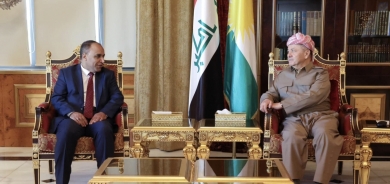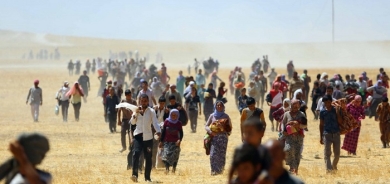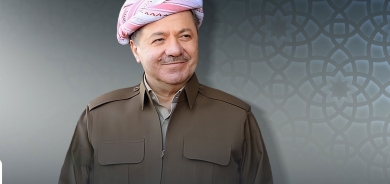Gordon L. Bowen to Gulan Magazine:Today the situation is different because many factors are pointing toward extortions as a solid superpower so the system of global power is changing
February 27, 2012
Exclusive Interviews

Gordon L. Bowen is Professor of Political Science and International Relations Department of Political Science at Mary Baldwin College. We contacted the Professor Bowen to discuss the current situation in the Middle East and he replied to our questions in an exclusive interview to Gulan Magazine as the following:* The events of the Middle East were not changes only in the ruling system but covers somehow geopolitics of the area, so if we discuss this point in your view to what extend the changes will affect the geopolitical map of the Middle East?
- I think this is a large question because the changes in Iraq is unfinished so its hard to tell you the upcoming affects, but its my hope that the violence of last month not lead to a larger scale of internal conflict within your country. This is disturbing because of the conditions in Syria next to Iraq and also generate violence not solution compared to the peaceful protests of last year that we think was successful for Egypt Tunisia and other places that did not take a part like Bahrain and others so we are all I think concerned about the recent upswing and perhaps its sources.
* After the fall of Berlin’s wall and collapse of former Soviet Union the west declared new world order. The system which supposed to consolidate freedom and democracy everywhere didn’t succeed. The changes in the Arabic countries are not less than the fall of berlins wall because it also brings democracy to this part of the world. So according to your opinion how the changes will continue?
- I think the internal situation of each of these revolutionary periods of 1989 and 2011 did arise from similar root from the aspiration of people denied to stop determination forcing forward, the difference in the structure of the power of the world in 1989- 1991 one of the great powers was in great decline of all US appeared ascendant. Today the situation is different because of many factors are pointing toward extortions as a solid super power so the system of global power is changing as did in 1989 but now we see a parent of several new power not just china but Brazil, India and other potential centers of power not to say that Europe could not become one, it’s not right now. So in 1989 we had a clear path to a new structure of power in the world with a single power US ascendant. But today the move toward many centered global system is more unclear how much brazil, India, china will take on great power responsibilities is not clear what is clear is extortion of the US to continue in the way of the last 10 or 12 years.
* Huntington suggested the theory of clash of civilization in 1991 and afterwards September 11 happened but they didn’t confess it so as not to prove the theory. Again the winning of the Islamic political parties proved that the east doesn’t want the democracy of the west. These are some opinions that are saying many people considered democracy as a product of the west. According to you to what extend do you see that the east may turn to a society against the west?
- I think china would prefer a leadership position of all of Asia and perhaps most of the third world. I don’t think that the aspiration of peoples still straggling for freedom and those who have recently want a self governance I don’t think there is desire to subordinate to another power, there will be self expression of a new path and may be that there are joining of Arab states in a common cause a league of states as always formally existed in the Arab league may be movement in direction for more cooperative foreign policies and may be economic integration I'm just speaking up 30 to 50 years but I don’t think that this is antagonistic new relationship with other centers of global power I think there will need to be a cooperation that not usually seen so I'm optimistic that the self government movement in the Middle East will produce not subordination to east or the west a new I'm hopping golden age of right and accountability. There are big economic challenges that it can make successful middle democracy and these need to be also work hard with its not enough to just have an oil export economy.
* Iraq’s situation is not stabilized so Iraq remains as another eastern station in which US spends 8 years in turning into democracy and secular western friend, nut neither Iraq become democracy nor US policy was successful that Iraqi people do not look at US as their friend. So to what extend west and US are taking lessons from Iraq or what they can learn from Iraq?
- I think you are asking how America is now doing his role in Iraq and 3rd world countries and their security challenges exist. I think what has happened was his financial exostion and a lesson learned that perhaps military hard power is not an effective tool to win heard and minds. The operation in Libya for example relied much more on Libyan liberating themselves from the dictator Kaddafi, it relied to a small extend on air power from outside but the main element was local and I think this strategy of stepping back Americas stepping back from large numbers of troops on the ground and a desire to conferee the type of political system that will emerge after a period of violence. This is greatly evaporated in the US the will of people to do, certainly the will of Obama’s administration to US. So this new fate it isn’t so new but the current phase the reliance on conformed operations and drown strike to target specific individual may be the more chosen tactical tool to achieve the US influence rather than operation in Afghanistan and Iraq which I think they have run their course and I think they have been not as successful as it originally hoped.
* Turkey is a member of NATO and a strategical allege to US but in many situations the Turkish policy doesn’t match the US policy or the western policy for example just like we saw in Libya and currently with Syria. According to your opinion to what extend the contradictions of Turkish policy with US and west harms the interests of US and west in Middle East?
- Actually expected that they all peruse their own national security interest and the tradition from the cold war was unusual and alliances of subordination were Turkey had to follow US because of the overriding of national security threat of soviet union this sort of alliance in which there is a senior partner and a junior partner what scudded always unusual global power structure we no longer have this power structure and we should expect more normal allied relationships which means that a time that states do have the tradition of alliance and good will between armed forces and political elite class still will see their own national security interest but differently from one another and Turkey may do things that annoy the US but to imagine US can twist their arms and make them be different than how they want to be is rely cope the path it is not possible the US reached a level of equality in relations with its allies appropriate to its own declining power in the global system structure.
* According to some realistic evaluations of the political equation of the Middle East all the fallen regimes of the Middle East were alliance to US also the remaining once like Saudi Arabia and Jordan are alliance to US but either they are upset because the US didn’t helped them when they needed so that makes US only friend in Middle East with Israel. So do you think that having Israel as the only friend in Middle east is enough for US?
- The friendship and alliances are not the identical thing, I think the relationship with Saudi Arabia is based on strategic calculation but both sides there is very little friendship that involved in the relationship between Saudi Arabia and US, it’s a calculation of national strategic interest that the house of Saud remains close to the strategic relationship with US big armed purchases, standardization of armed forces and this sort of things but on many issues they see things differently and I'm sure that the house of Saud was worried by the fall of Mubarak this troubling I’m sure. So the alliance with Saudi Arabia is not base on friendship it’s based on strategic calculation of sharing the interests. Those interests can change but so far for 60 years may be its not. You ask about the relationship with Israel is more complicated because there you do have armed friendship as well as strategic alliance and certainly the benefits to the US of the relationship with Israel are more called to question these days than in sometimes passed but within the political meaning of the competition for power within the US the democratic system. Within the political system of the US support for Israel is uniform of so that exceed what mutual strategic calculation might dictate but it’s a reality especially within the republican party but it’s also something that Mr. Obama and the democrats struggle to assure the people of their publicity to Israel so in that sense I think a shift based on a strategic calculation to a more confrontational relationship with Israel is very heavily politically dangerous inside the US domestic politics and for these reasons the alliance rest on additional pillars not just the strategic calculation but this political process toward Israel’s foreign political position I don’t mean that its changing but I could be surprised but Mr. Obama is more sympathetic with Israel now than he was in his first year, he understands the danger politically to himself if he is anti-Israel.
* Last Question: Do you think that the situation may turn into suspended problems just like the Kurdish question and Palestinian state declarations?
- This is a big challenge because there is a strong wind of the popular support in favor of the new revolutionary moment and hope it brings but if this hope is not coped by consolidation of solid systems if some sort of new dictators emerges or the armies step forward al these could still happened in Egypt then I think you do have a long term frustration problem of this generation that taking on great risks look at Syria, you are taking great risk on behave of the idea of self determination and so these frustrated young people if there is not an economy that is built that can give them jobs and hope for the future as well as political freedom then we may see a continuing unrest erupt over the following decades. In this sense it could be a problem that cannot be solved like the Kurdish question or the Palestinian question and that will be regrettable because if you look after the revolution of 1989 some major changes were be able to be achieved peacefully like the separation of the check and Slovak these sort of changes for the better need to happen, integration into the EU this was prosperity to the central Europe that needs to happen we need to see the viper economy opportunity for new business and social systems that provide good schools many of the middle eastern countries are not destine to be poor there is substantial basis for wealth but it takes sacrifice of the generation to built the opportunity so that everyone feels included and this is a big problem for you, and I think the problems may vary from a place to a place but my main point is that democracy needs a growing economy a door that has opened for the future.
Transcription: Mahmud Samih















